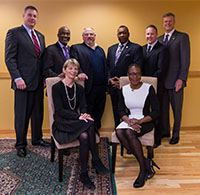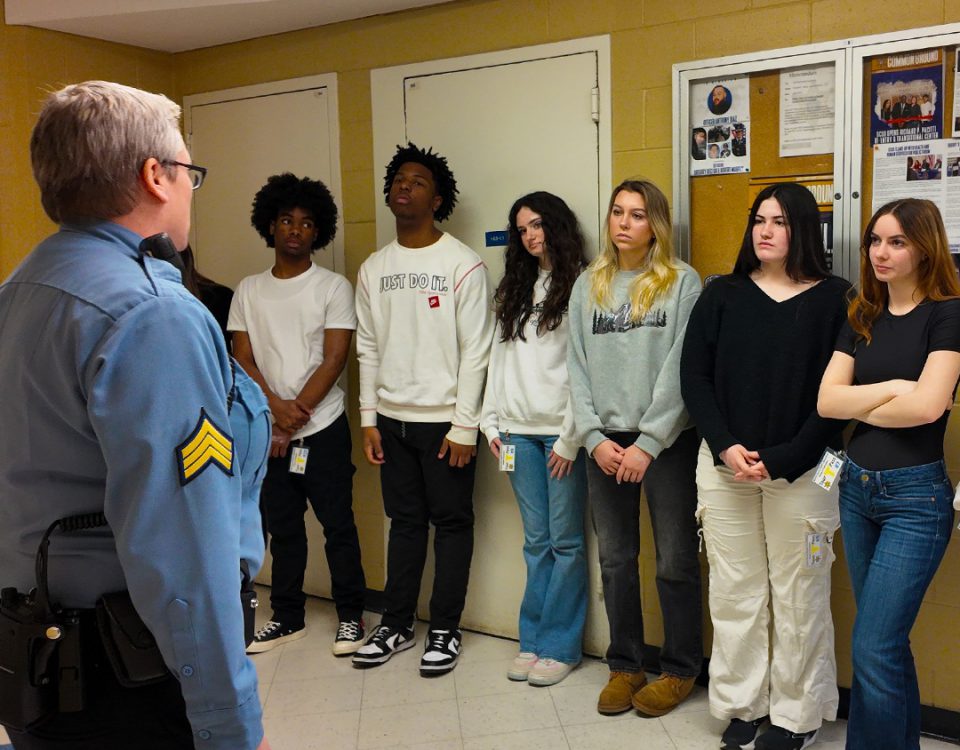- To serve and protect the citizens of Suffolk County.
- (617) 635-1000
- info@scsdma.org
DEPARTMENT HOLD CONVERSATION ABOUT SUBSTANCE ABUSE & MENTAL HEALTH CARE

SHERIFF TOMPKINS OF SUFFOLK COUNTY NAMED PRESIDENT OF MASSACHUSETTS SHERIFFS ASSOCIATION
December 14, 2015
SHERIFF TOMPKINS HOSTS U.S. ATTORNEY GENERAL LORETTA LYNCH AT HOUSE OF CORRECTION FOR DISCUSSION ABOUT REENTRY, CRIMINAL JUSTICE REFORM
January 28, 2016FOR IMMEDIATE RELEASE:
January 6, 2016
CONTACT: Peter Van Delft
(617) 704-6682
SHERIFF TOMPKINS, DEPARTMENT HOLD CONVERSATION ABOUT SUBSTANCE ABUSE & MENTAL HEALTH CARE
Suffolk County Sheriff Steven W. Tompkins and the Department hosted “A Conversation About Substance Abuse & Mental Health Care In The Commonwealth,” as part of its Directions for Corrections forum series.
Held at Roxbury Community College, the event drew 350-plus participants and featured a distinguished panel of experts that included: Massachusetts Governor Charlie Baker; Secretary of the Executive Office of Health & Human Services Marylou Sudders; Middlesex County Sheriff Peter Koutoujian; President and CEO of the Dimock Center Dr. Myechia Minter-Jordan; Joseph Feaster, Jr., Esq.; and iRecover Founder Jack Kelly. RCC President Dr. Valerie Roberson introduced former drummer for The Del Fuegos and founder of Right Turn Woody Giessmann, who shared his personal story of addiction and recovery.
During the two-hour discussion, panelists touched upon many of the obstacles faced by people struggling with addiction and mental illness, and the concerns voiced by family members and friends attempting to help their loved ones.
“I wanted to convene this forum because I believe that we as a community really need to wrap our arms around those who are suffering with addiction and mental illness,” said Sheriff Steven W. Tompkins, kicking off the conversation.
“We’re talking about addiction and mental health in a way that we haven’t talked about them before,” said Governor Charlie Baker. “But, we need to do more and we are working to do more by opening more recovery beds and addressing the disparities in care for those with mental illness and addiction. Everyone deserves to have quality care regardless of zip code.”
Middlesex Sheriff Peter Koutoujian strongly agreed, stating that, “A person shouldn’t have to go to prison to get good substance abuse & mental health treatment.”
Addressing the issue of treatment, Dr. Myechia Minter-Jordan spoke about the need to connect those in need with available resources in a more effective way.
“What we are often seeing at The Dimock Center are families that don’t know where to go for help,” said Dr. Minter-Jordan. “We need to have centralized resources that make it easier for those seeking services to get them.”
As one who has powerfully advocated for help for those with mental illness, Joseph Feaster, Jr., Esq. shared the deeply personal story about his family’s struggle to deal with his son’s mental illness, which would tragically culminate in his son’s suicide. Feaster then explained that true progress in treatment of mental illness would come when society finally accepts it for what it is: a disease, not a stigma.
“My son had an illness which is just like an illness in any other organ of the body,” Feaster said. “It’s no different than a liver, it’s no different from a heart or a kidney. Mental illness should be treated by society no differently than breast cancer or diabetes or heart disease.”
Throughout the conversation, a host of important issues were discussed including greater ease of navigation of the health care system, the expansion of mental health and substance abuse services across the Commonwealth, and the much-debated proposal for legislation around involuntary commitment for those suffering with severe addiction.
“If you don’t have a bill that is tough and controversial and, in my opinion, impactful, then you’re not going to change any of this,” said Jack Kelley, a member of the recovery community and founder of the iRecover application.
Speaking to the Baker Administration’s upcoming plans for the opening of more addiction recovery beds and a more user-friendly experience for those desperately seeking assistance was Secretary of the Executive Office of Health & Human Services Marylou Sudders, who said, “Come January, we will have a treatment bed finder and one website with one phone number that will be linked to services, because the system has, until now, been so difficult to navigate.”
Ultimately, said Sheriff Tompkins, it is everyone’s responsibility – from legislators and health practitioners to family and friends – to fight for a system in which all citizens in need of addiction recovery, mental illness and wellness services receive the care they need.
“At the end of the day, those of us who can help, it’s incumbent upon us to help,” Sheriff Tompkins said. “The hallmark of any vibrant community is how we take care of our most compromised, no matter who they are.”



